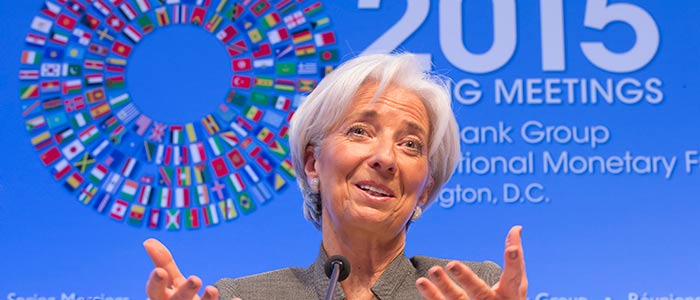WEb_IMF_ChristineLagarde_17169021875_5ac675797e_o.jpg

Christine Lagarde. Credit: IMF Staff Photo/Stephen Jaffe
Speaking at an event in Washington DC earlier this week, Lagarde said that, while the sentiment was a result of the negative consequences of globalisation, it also reflected job displacement triggered by big technological breakthroughs, and changes in manufacturing and the way services are provided.
“We will see more and more of that,” she said. “That phenomenon is [in advanced economies now] but will be elsewhere in the future. And all policymakers have to be aware of it and prepare.”
She pointed to countries such as Bangladesh, where more than 3.5 million people were employed in the textiles and clothing industries in 2011, according to the most recent data from the United Nations.
“A lot of the textile industry jobs in 10 years’ time will have disappeared, replaced by a combination of artificial intelligence and robots,” she said. “There are thousands and thousands of jobs at risk there.”
She said this put a “heavy burden” on policymakers to ensure people were properly educated and equipped with the ability to adjust, retrain and move from one job to the other.
“It will be a massive change,” she said. “There have been massive changes in the past as well, which have been feared and raised anxiety … What we need to do, being informed of what has happened in the past, is prepare for that.”
Lagarde also reiterated the fund’s argument that, while globalisation has had some negative consequences, overall free trade had been positive for the world. She stressed countries should now focus on securing the benefits of trade and ensuring no one is left behind, rather than turning away from globalisation altogether.
On Greece, she held firm on the belief that the embattled country has too much debt. The fund has so far refused to participate in the Greece’s third, €86bn bailout as a result.
Talks between the IMF, Greece and the country’s European creditors on reducing its burden are continuing, with possible measures including an extension of maturities or long-run caps on interest rates.
Lagarde stressed: “Something’s got to give. Either we cannot provide financing and the Europeans have to sort it out or, if we are providing financing, then the debt has to be sustainable. And, for the debt to be sustainable, it has to be reduced in terms of debt services and debt overall.”
The focus of the event, however, was on gender equality. Lagarde said she would like to “go further”, building on initiatives such as gender budgeting, to include “gender surveillance and gender programming”.
This would see a gender element built in to the IMF’s regular health checks on countries’ economies and its financial aid packages. In the latter case, fund support would be contingent on countries implementing prescribed reforms to support women in the economy.













